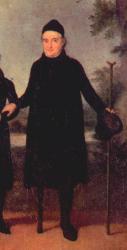- |
User Links
Johann Michael Nathanaiel Feneberg

www.theodor-frey.de/feneberg.htm
| Short Name: | Johann Michael Nathanaiel Feneberg |
| Full Name: | Feneberg, Johann Michael Nathanaiel, 1751-1812 |
| Birth Year: | 1751 |
| Death Year: | 1812 |
Feneberg, Johann Michael, was born Feb. 9, 1751, at Oberdorf, Allgäu, Bavaria. He was for some time tutor in St. Paul’s College, at Regensburg, and in 1785 was appointed professor in the Gymnasium at Dillingen. In 1793 he became parish priest of Seeg, in Allgäu, where he had as assistants Christoph Schmid, Martin Boos and Johannes Gossner; but in 1805, on account of his Evangelical teaching, was removed to Vohringen, near Ulm, where he died Oct. 12, 1812.
The only hymn by him translation into English is:—
Liebe und ein Kreuz dazu. [Cross and Consolation.) Of the origin of this beautiful hymn Koch, vi. 554, relates that it was "written at Seeg in 1794, as he, in the experience of the blessings of the cross after the amputation of his right foot, rendered necessary by an unfortunate fall on Oct. 21, 1793, had once more, on Easter Sunday [1794], renewed in body and soul, been able to ascend the pulpit as 'a wooden-legged man.'" It appeared in the Sammlung erbaulicher Lieder zum Gebrauche in christlichen Häusern, Kempten, 1812 (edition 1817, No. 102), in 8 stanzas of 4 lines. It is translated as, "Love and a cross together blest," by Miss Borthwick in Hymns from the Land of Luther, 1862, p. 38; 1884, p. 205. [Rev. James Mearns, M.A.]
--John Julian, Dictionary of Hymnology (1907)
| Texts by Johann Michael Nathanaiel Feneberg (2) | As | Authority Languages | Instances |
|---|---|---|---|
| Möcht hier eine Gotteshütte | J. M. N. Feneberg (Author) | German | 8 |
| O leide, leide gern, es ist der Will des Herrn | Johann Michael Nathanael Feneberg, 1751-1812 (Author) | German | 1 |


 My Starred Hymns
My Starred Hymns


